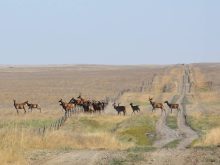SASKATOON – The Canadian Wheat Board’s lawyers could have more business on the horizon.
An Alberta-based farm organization says it’s investigating the possibility of launching a class action suit to recover money it says farmers have lost as a result of the CWB’s monopoly on export sales of western wheat and barley.
Buck Spencer, president of the Western Barley Growers Association, says the association will talk to like-minded groups about suing the federal government and perhaps certain individuals in the government and at the wheat board.
Read Also

Bunge’s crop mix is changing
Bunge has predominantly been a soybean processing firm, but that’s about to change after the merger with Viterra with softseed processing and grain merchandising gaining ground.
“This suit would strive to recoup millions of dollars that western farmers have lost over the (past 50) years due to the government buying monopoly and the highly regulated and non-competitive system it propagates and protects,” Spencer said in a news release.
The barley growers association is already involved in a legal challenge of the board’s monopoly. That suit is to be heard in a Calgary courtroom this fall.
Spencer said the board marketing system prevents farmers from selling to lucrative barley markets and curtails value-added processing and diversification.
Wheat board a benefit
Wheat board information officer Brian Stacey said that is not the case and pointed to the recent wheat board commissioned study by a team of prairie economists as evidence.
“It showed quite the opposite, that the CWB enhances value for producers,” he said.
The economists looked at CWB sales contracts and concluded the board was able to use its status as single-desk seller to earn about $13.35 more a tonne on sales of hard red spring wheat from 1980-94 than multiple sellers would have.
Stacey added that having to deal with the barrage of lawsuits and other attacks on the board interferes with the agency’s ability to do its job of selling grain and forces it to spend farmers’ money defending the CWB Act in court or in public forums.
“The extent to which this happens certainly takes away from doing more proactive things,” he said.














